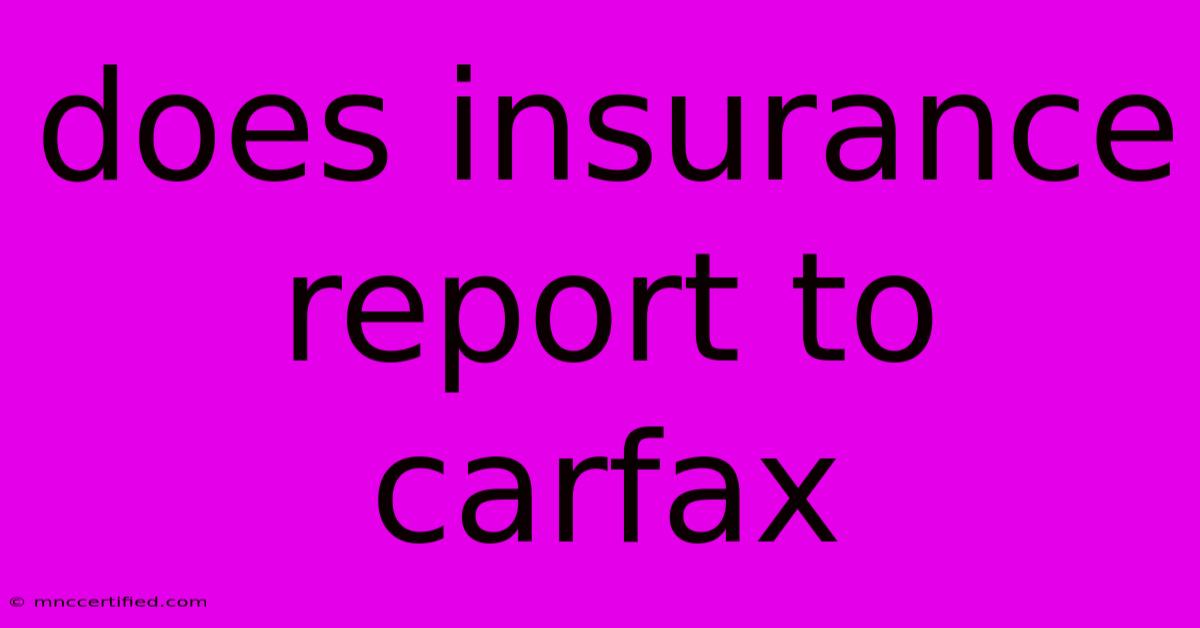Does Insurance Report To Carfax

Table of Contents
Does Insurance Report to Carfax? Understanding Your Vehicle History Report
Buying a used car is a significant investment, and understanding its history is crucial. One of the most common resources for checking a vehicle's past is Carfax. But many wonder: Does insurance report to Carfax? The short answer is complex, but generally, no, not directly. Let's delve deeper into the specifics.
How Carfax Gets its Information
Carfax compiles its vehicle history reports from various sources. These include:
- DMV Records: State Department of Motor Vehicle (DMV) records are a primary source, providing information on title transfers, odometer readings, and registration details.
- Repair Shops: Many repair shops and dealerships voluntarily report repair information to Carfax. This data might include details about accidents, damage repairs, and the parts used.
- Insurance Companies: This is the key area of confusion. While insurance companies don't directly send reports to Carfax, information can indirectly make its way into the report. This happens in a few specific ways:
Indirect Reporting from Insurance Companies to Carfax
- After an Accident: If an accident is severe enough and involves an insurance claim resulting in a total loss or significant repairs, the repair shop's records (which often include the claim information) might be reported to Carfax. This isn't a direct report from the insurer, but rather a secondary source feeding into Carfax's database.
- Salvage Titles: When a vehicle is declared a total loss by an insurance company, it receives a salvage title. This information is usually recorded with the DMV and subsequently included in Carfax reports.
What Insurance Companies Don't Report to Carfax
It's vital to understand what insurance companies typically don't report:
- Minor Accidents: Small fender benders or minor repairs settled directly without involving a shop or significant claim may not appear on Carfax.
- Comprehensive Claims: Claims related to things like hail damage, theft recovery, or vandalism may not always be included, unless extensive repairs were necessary.
- Routine Maintenance: Insurance companies don't report routine maintenance like oil changes or tire rotations.
What Information Can You Find on Carfax?
While insurance companies don't directly provide a comprehensive history to Carfax, you can still find valuable information related to insurance claims, including:
- Salvage Brand: If the vehicle has been declared a total loss, this will show up clearly on the report.
- Accident Indicators: Even without explicit detail, the presence of multiple repairs or a history of damage may suggest past accidents, even if the insurance claim details aren't available.
- Total Loss History: As mentioned, if the vehicle was declared a total loss, this will be prominently displayed.
Beyond Carfax: Other Resources for Vehicle History
Don't rely solely on Carfax. Consider using other services like AutoCheck for a more comprehensive picture. These services might have access to slightly different data sources.
Conclusion: The Importance of Due Diligence
While insurance companies don't directly report to Carfax, the indirect reporting system means relevant accident and damage information can appear. However, it's essential to remember that Carfax reports aren't perfect. Always perform a thorough inspection of the vehicle, obtain a pre-purchase inspection from a trusted mechanic, and ask the seller for as much information as possible about the vehicle's history. Remember that the absence of an accident on the report doesn't guarantee the car hasn't been in one. Thorough due diligence is crucial for a successful used car purchase.

Thank you for visiting our website wich cover about Does Insurance Report To Carfax. We hope the information provided has been useful to you. Feel free to contact us if you have any questions or need further assistance. See you next time and dont miss to bookmark.
Featured Posts
-
Kendrick Lamar Drops Gnx Album Review
Nov 23, 2024
-
Bundesliga Bayern Vs Augsburg Odds And Best Bets
Nov 23, 2024
-
Cleveland Council Faces Redistricting Deadline
Nov 23, 2024
-
Products Offered By Star Supply
Nov 23, 2024
-
Bethany Choice Health Insurance
Nov 23, 2024